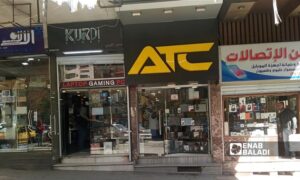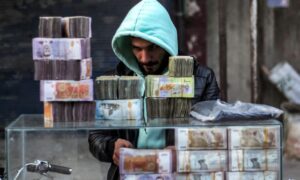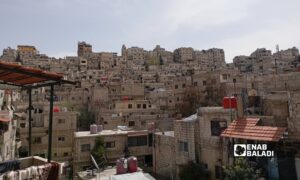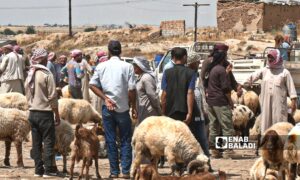
Al-Assad’s decrees to face “dollarization” … Strict but fragile

Enab Baladi – Mais Shtian
“The two decrees, stipulating aggravated penalties for those dealing in currencies other than the Syrian Pound, are an introduction to the fight against the phenomenon of dollarization,” said Hazem Karfoul, the Governor of the Central Bank of Syria, in an interview broadcast on the official Syrian channel on January 21, 2020.
Karfoul’s statement is clear, and it means closing doors currently to any foreign currency that would be used in parallel with the Syrian Pound or as an alternative to it in circulation. The Syrian economy was moving towards “dollarization,” due to the significant decline in the value of the Syrian Pound over the previous nine years, and the spread of dealing in US Dollar and fixed currencies, as well as resorting to possession of gold, as this precious metal is considered a haven and keeps the value of savings.
Under the recent decrees, the government closed several institutions that deal in dollars and exchange companies through which merchants and industrialists obtain the foreign coins needed to finance their imports. These procedures have raised concerns among those traders, as they faced the possibility of disrupting the functioning of their factories.
The Central Bank of Syria presented a proposal to the industrialists to sell them one dollar at a preferential price, precisely 700 Syrian Pounds, and to finance importing 44 raw materials and production requirements, said the Secretary of the Damascus Chamber of Industry and its countryside, Ghazwan al-Masry, to Aliqtisadi website, after a meeting held on January 29, between the Governor of the Central Bank of Syria, Hazem Karfoul, and some industrialists.
Al-Masry indicated that what was agreed upon during the meeting will be presented at the next session of the Economic Committee for approval.
Serious economic indicators
The Syrian Pound has lost about 20 times its value since 2011, and its price against the US Dollar was nearly 50 Pounds, while its price has now reached more than 1,000 Pounds on the black market.
Over the previous months, the Syrian Pound has witnessed an unprecedented reversal, affected by the Lebanese crisis, the freezing of deposits in Lebanese banks, and American as well as European sanctions on the government of the Syrian regime. The Pound recorded at the beginning of 2020 a decrease of 30% in its value against the US Dollar, compared to the end of the year 2019, according to the “lira today” website, specialized in currency exchange rates.
The inflation rate in Syria reached 826 points until 2019, while the inflation rate at the beginning of 2010 was 142.10 points, according to the latest official statistics released by the Syrian Center for Statistics.
The purchasing power index in the capital Damascus witnessed a significant drop, reaching 10.64 points, and the global site “Numbeo” ranked it as very low.
According to a report issued by the United Nations at the beginning of March 2019, 80% of Syrians live below the poverty line.
All these indicators show a significant decline in the economic and living situation, and a considerable drop in vital economic sectors in Syria, after nine years of war.
What is “dollarization”?
“Dollarization” is defined as the process whereby a country gives up its local currency and replaces it with a more stable currency, such as the US Dollar, the European Euro or the Japanese Yen.
The process of “dollarization” takes place either completely, when the state makes it as an official currency, or in part, when some individuals adopt it in their dealings.
A country resorts to the process of “dollarization” as a reaction to the instability of the internal economic situation, the loss of the local currency’s value and the failure of citizens’ confidence in this currency.
In periods of high inflation resulting from an excessive increase in money supply and low-interest rates, paper money loses its function as a store of value and reduces its purchasing power. All the reasons mentioned above drove the citizens to get rid of the weak currency by buying the stronger hard currency, such as the dollar, as a way to ensure financial stability, and this is called “partial dollarization.”
Many countries have resorted to “dollarization” after their economies collapsed, and the value of their main currency declined. In January 2000, the President of the Republic of Ecuador issued a decision to adopt the US Dollar as an official currency, provided that the local currency (Sucre) preserves a marginal role. This decision came after a complete loss of confidence in Ecuador’s economic policy and the authorities’ inability to face the pressure the Sucre was subjected to.
Many African countries used the dollar, the Euro and the Chinese Yuan, after witnessing a sharp decline in the value of their local currencies until they became worthless. Also, Kosovo used the Swiss Franc, the North Cyprus region used the Turkish Lira, and the Russian Ruble is used in the former Soviet Union (USSR) countries.
Did the new decrees bury the process of “dollarization” in Syria?
The strict measures of the Syrian regime’s government against those dealing in other than the Syrian Pound suggest that we will not see the return of the Dollar deals in the areas of the regime’s control, due to fear of arrest and fines. Will the government go back on its decisions and decrees? Will we see the return of and dealing with the dollar and “dollarization”?
The researcher and economic analyst Younis al-Karim said to Enab Baladi that the “dollarization” is brewing and that the decrees and decisions that impose severe penalties against dealers in other than the Syrian Pound are part of the psychological war that the regime is leading to stop the deterioration of the Pound.
He pointed out that the campaign against dealing with dollar affected some individuals and small commercial activities, not large companies.
Al-Karim linked entry to the “dollarization” process with the start of the reconstruction process, and the listing of foreign investment companies, with which the government signed contracts to invest in infrastructure (roads, oil fields, phosphates, roads, electricity…), including Russian and Iranian companies.
He explained that these companies would not accept establishing investments in a country that deals only in their local currency.
Al-Karim mentioned the Russian company “Stroytransgaz,” which the Ministry of Oil granted in March 2018 the right to extract phosphate for 50 years from the city of Palmyra, insisting that it would not accept the sale of its phosphate products in the Syrian Pound.
One of the reasons that will push towards “dollarization” is that the Syrian economy is currently mostly dependent on imports, and therefore the necessity of foreign exchange for Syrian industrialists and merchants to pay the value of the imported materials, especially since the government has stopped subsidizing many imported goods; therefore, the Central Bank, industrialists and merchants will not be provided with the necessary foreign currencies.
Al-Karim considered that one of the reasons that would drive the regime to withdraw decrees “3” and “4” is the decision issued by the Council of Ministers to restrict the sale of real estate to banks and restrict the withdrawal of funds from those banks.
He explained that the decision would freeze the movement of real estate trade, which is the leading sector in Syria after the decline of industry and agriculture. Therefore, investors will face the difficulty of business in real estate and the lack of liquidity on the one hand, and the prevention of dealing in dollars and other foreign currencies on the other; thus, stopping their commercial activity.
Al-Karim pointed out that the government will turn to “partial dollarization” and not to “total dollarization,” because the latter needs the approval of the Central Bank in the country whose currency will be approved in the “dollarization” process, and this is not possible in light of European and American sanctions imposed on the Syrian regime government.
On the margins
The President of the Syrian regime, Bashar Al-Assad, issued decrees “3” and “4” on January 18, stipulating stricter penalties for those dealing in other currencies than the Pound.
Decree No. 3 insisted on imprisonment and the payment of a fine for those dealing in other than the Syrian Pound. The decree was an amendment to the second article of Legislative Decree No. 54 of 2013, which used to punish non-Pound dealers with imprisonment from three months to three years.
According to the new decree, every person who deals in a currency other than the Syrian Pound as a means of payments “shall be punished by temporary imprisonment with hard labor for no less than seven years.” He/she shall be punished with “a financial fine equivalent to twice the value of the payments or the amount in use or paid or services or goods offered,” in addition to confiscating payments, sums involved or precious metals for the benefit of the Central Bank of Syria.
Decree No. 4 imposes the penalty of temporary detention, and a fine of one million to five million Syrian Pounds “for anyone who tells, publishes or re-publishes fabricated facts or false or fictitious allegations by any means, to cause decline or instability in national banknotes or prices specified in official bulletins, and to undermine confidence in the strength of the country’s currency and bonds.”
The decrees coincided with a warning issued by the Ministry of the Interior against dealing with foreign currency in Syria, in commercial circulation. The Ministry confirmed, through its Facebook page, on January 17, the intensification of its patrols to monitor companies, shops and people, in an attempt to suppress the phenomenon and arrest violators.
The Central Bank of Syria, in turn, issued a circular on January 20, in which it declared readiness to buy dollars from citizens at the preferential price it set for humanitarian organizations, which is 700 Syrian Pounds against $1, without documents.
if you think the article contain wrong information or you have additional details Send Correction
النسخة العربية من المقال
-
Follow us :

















 A
A
A
A
A
A








 More Economy
More Economy